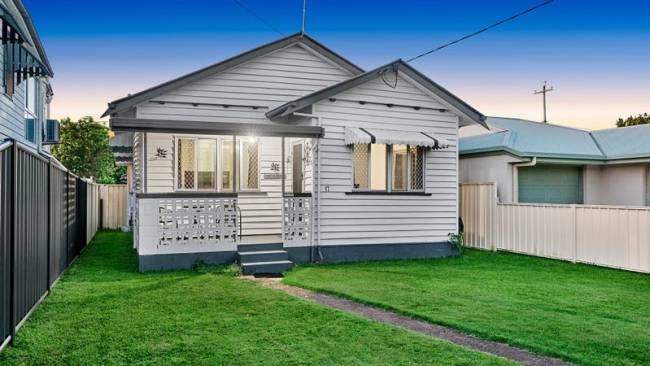Property investment: How to start a property portfolio and what to consider
Considering investing? Here’s what you need to consider before taking the plunge, and expert tips on what and where to buy.

If the term “as safe as houses” is anything to go by, investing in property can be a solid way to build wealth.
The latest stats seemingly support this, with a typical Australian home gaining 16.1 per cent in value and national rental rates jumping 6.6 per cent in the past year.
The former marked the fastest annual growth in 17 years and the latter, the quickest in 12 years, according to CoreLogic.
RELATED: Complete guide to Victoria’s 132 rental law reforms
Full lists of minimum standards, minor modifications revealed
Property investors told to ‘follow the infrastructure trail’
But not every property is a winner, and there is plenty budding investors need to consider before they start building a portfolio.
We turned to the experts for some advice.
WHERE DO I START?
The first question would-be property investors should ask themselves is: what do I want this property for?
This is the advice of Stockdale & Leggo chief executive – and seasoned investor – Charlotte Pascoe, who recommended asking five key questions.

“Are you looking for depreciation and tax benefits? Or do you want to one day live in it, so are you buying for your future self?” Ms Pascoe asked.
“Are you buying it because you want capital growth? Or so you can leverage it and get more properties? Or are you looking for rental yields?
“Figuring out what you want the property for is the first step many new investors forget to do. They should sit down with their accountant or financial adviser and map out their next 10-20 years.”
Buyer’s advocate Frank Valentic agreed property investors should buy with a long-term view as opposed to “trying to time the market”.
Mr Valentic recommends his clients aim to hold their investments for seven to 10 years – in line with the latest CoreLogic figures showing Australian houses held for nine years and units, for eight, typically sold for a profit.
“And because of the high transaction costs – like stamp duty rates and capital gains taxes – you generally don’t want to be trading properties on a regular basis,” he said.
Mr Valentic said most of the successful investors on the books at his agency, Advantage Property Consulting, focused on achieving high “capital growth first, and rent returns second”. But he agreed each individual needed to work out what they wanted from
an investment.
“In the initial five to 10 years of building a portfolio, most of my investors are focusing on building capital growth for long-term wealth creation,” he said.
“But as some get older and move into the retirement phase, their focus may turn to having cashflow-positive properties and strong rental returns (as a more immediate income).”
WHAT SHOULD I BUY?
Two real estate cliches actually help answer this question, according to Mr Valentic.
“It’s all about location, location, location,” he said. “If a property isn’t in the right location, we won’t even look at it for an investor.
“Also, land value appreciates and buildings depreciate. So if you can get a house with some land, that’s gold for an investor.
“If you can’t afford a house, try to buy a unit with some land.”

Expanding on what the “right location” was, Mr Valentic said easy access to the CBD had traditionally been a big factor. That had changed with the normalisation of working from home – but whether that would be permanent was yet to be seen.
Proximity to key amenities, such as public transport, shops, eateries, parks and schools, and lifestyle perks such as the beach, would always boost your chances of earning strong capital growth and attracting a tenant.
REA economist Paul Ryan said search activity on realestate.com.au indicated lifestyle and space had pushed up renters’ wishlists, with living near the city becoming less important.
“People are working from home and thinking, ‘if we’re not working from the office, can we choose somewhere with more lifestyle amenity’,” Mr Ryan said. “Rental yields tends to be higher the further you get from CBDs, too – and I don’t think that’s a Covid effect.”
Ms Pascoe encouraged first-time investors to consider regional areas for this reason, as well as their affordability.
“Too many investors buy in their backyard,” she said.
“If you’re going to invest in a regional area, you want to know what infrastructure is coming in the next five to 10 years – if a train station is going in, or a hospital, the area is expecting a population boom.”

This meant a larger pool of prospective tenants – and buyers when it was time to on-sell the property, she said.
“(New infrastructure) can increase your property’s price overnight,” she said.
Investing in a tree or sea-change area also opened up the possibility of listing the property on Airbnb or another short-stay accommodation platform – a potentially lucrative option.
Ms Pascoe also advised buying a low-maintenance home, or something you could fairly easily add value to. Considering the key tenant demographic in your target suburb could also get a renter in quick smart.
“An Art Deco apartment in South Yarra is going to rent out any day of the week,” she said. “But when you get as far out Croydon, tenants expect a backyard.”
LANDLORD LIFE
Before becoming a property investor, it is important to consider what it means to be a landlord.
Ms Pascoe said this should involve factoring additional costs into your purchase budget, including property manager fees and a “slush fund” to cover any urgent repairs.
“Remember, while you own the property, it will be someone else’s home,” she said.
She also advised having money put aside in case your property became vacant and finding a new tenant did not happen right away.
And with several states overhauling their rental legislation – led by Victoria, where more than 130 reforms have applied since March – it was integral landlords were educated on relevant tenancy laws.
She flagged Victoria’s new minimum standards as a key area for landlords to brush up on, with rentals now required by law to have fitted heaters, hot and cold water, and kitchens with functioning sinks, cooktops and ovens – among other features.
NSW Fair Trading regulations also stipulate rental properties must be structurally sound, have adequate ventilation and include adequate natural or artificial light in rooms. Landlords must also offer enough electricity and gas sockets, while basic fittings such as sinks and bathroom facilities must be in working order.

“Before any investor goes through with buying a property, they should get a property manager to look at it and confirm whether it will be compliant with the minimum standards,” Ms Pascoe said.
“And if not, find out what kind of cost will be involved and then you can make the decision about whether you want to purchase.”
Victorian landlords should be aware the definition of “urgent repairs” has been expanded to include the breakdown of airconditioning, smoke alarms and pool fences, as well pest infestations or mould caused by the building structure. Tenants can also no longer “unreasonably” be denied keeping a pet, and making minor modifications to their homes.
And under NSW guidelines, a landlord or agent needs to disclose if the property is in a strata complex where repairs or new works are planned. Any criminal operations, such as premises used to manufacture or grow a prohibited drug, are considered a “material fact” and must be declared to tenants.
Sign up to the Herald Sun Weekly Real Estate Update. Click here to get the latest Victorian property market news delivered direct to your inbox.
MORE: Housing boom rolls on through mass city exodus
How Victoria’s rental pet law reform is faring a year on
Developer’s $22m splurge on Australia Post site
Originally published as Property investment: How to start a property portfolio and what to consider



